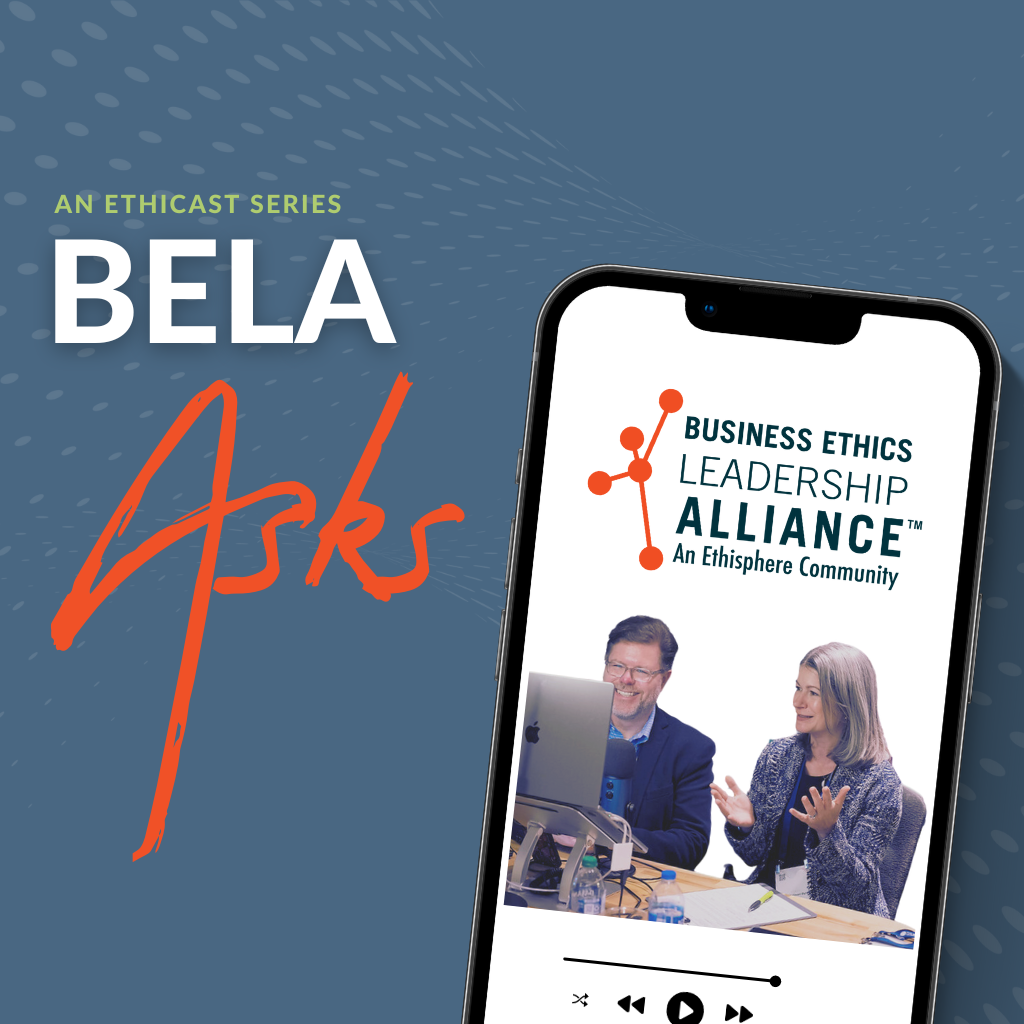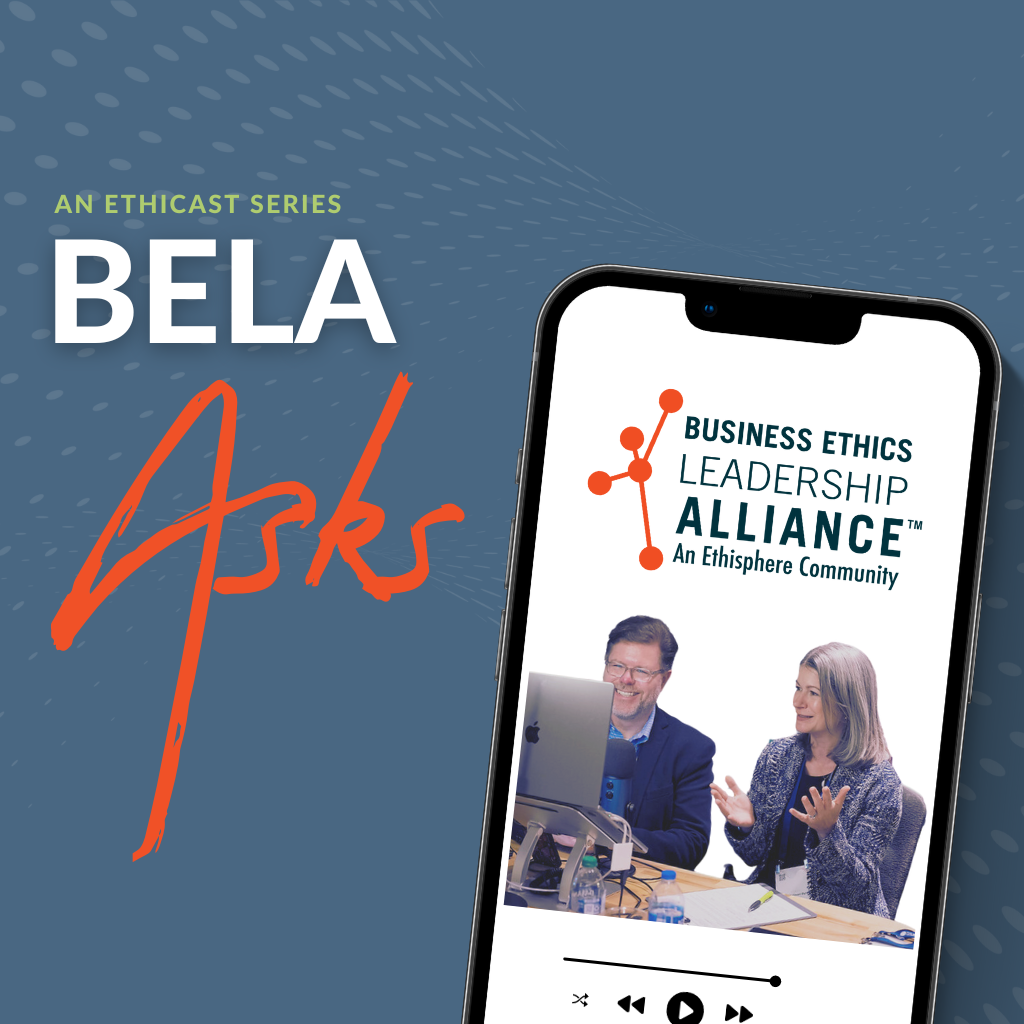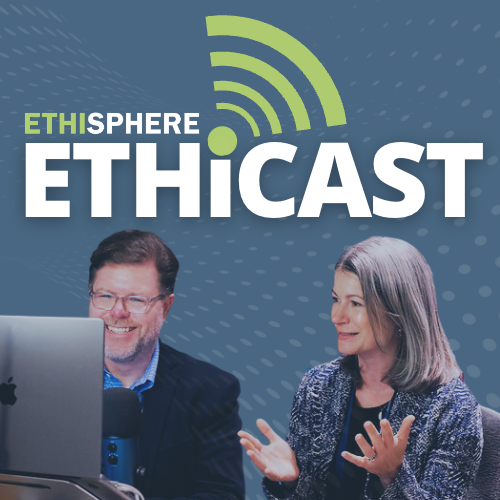Episode Transcript
[00:00:00] Speaker A: Hi everyone. Today we'll take a look at how the ethics and compliance space is navigating the challenge of implementing AI into their program's workflow. I'm your host, Bill Coffin and this is the Ethicast.
You couldn't escape the hype cycle around artificial intelligence for the last year or so. But for ethics and compliance teams it was more than hype. For years, E and C teams have searched for more efficient ways to conduct the programmatic aspects of their work. Meanwhile, changing regulatory expectations, the ever raising bar of best practices and a growing remit of responsibilities without always getting a corresponding lift in resources have left many E and C teams feeling stretched thin. For them especially, the promise of AI has been more than a novelty. It has been nothing short of a strategic transformation of how much value and what kind they can produce for their respective organizations. The trick, however, has been understanding how to transition from artificial intelligence speculation to AI implementation. Joining us today to speak on this incredibly exciting topic is Parth Chanda, Executive Vice President, Risk and Compliance Transformation of Case iq. Previously as the founder of lextegrity, lead Counsel for Pfizer's global anti corruption program and Senior Compliance Counsel for Avon, Parth has been at the vanguard of enterprise efforts to combat bribery and fraud. He is a fixture in the global integrity community and we're excited to have him on the show today. Parth, thank you very much for appearing on the Ethicast.
[00:01:35] Speaker B: Yeah, thanks so much for having me.
[00:01:36] Speaker A: Bill, what are some of the most compelling trends that you've seen in the last few months regarding the impact of AI upon traditional ethics and compliance functions? Especially given how much of a spread there seems to be among the take up rate by ENC programs?
[00:01:51] Speaker B: You know, when you look at how AI is landing in the ethics and compliance space, I think the honest answer I can give is it's complicated. You know, the impact has today has mostly meant more work for compliance officers, more work and more worry. You know, compliance officers are often owning the approval of new AI projects or they're at least involved in some sort of governance committee that reviews proposals for AI projects. And they're coming fast and furious at the ethics and compliance team. And so they're having to think about a lot of new concerns, new uses and new risk issues like responsible AI use, algorithmic bias, you know, really understanding the models and whether they're black boxes models or not, data confidentiality, reputational risks, etc. So there's a lot of talk about risks and the workload for the ethics and compliance officer. I Think to the detriment of those compliance teams really being able to have the time and freedom to really explore how AI can make their teams more effective and efficient while really allowing them to better manage their risk, better prevent and detect non compliance. But I think the good news is that we're starting to see more ethics and compliance teams now. Kind of more than a year into the launch of some of these AI tools on the marketplace, we're seeing a lot of ethics and compliance teams getting more comfortable with AI, not just curious, but really experimenting, finding use cases that really actually fit into their day to day and have a materially positive impact on how they do things. And so we are really looking forward to unpacking some of that today with you.
[00:03:23] Speaker A: Well, speaking of use cases, that brings us to kind of the really big question of this whole interview, which is what would you say are some of the most pressing use cases for integrating AI into ENC functions, especially around things like monitoring and investigations?
[00:03:35] Speaker B: Yeah, no, wonderful. Honestly, I think monitoring investigations are some of the fastest areas where we're seeing uptake, where we're seeing compliance teams get real value from AI right now, Quick wins. And so let's talk about monitoring first. So my experience and expertise is really in the financial risk side, looking at ERP data, TNE data, financial data for risks like fraud, bribery, corruption, asset misappropriation, conflicts of interest, et cetera. And here AI can be just a fantastic tool. You know, the large language models like ChatGPT that work with text have fewer applications in this space. And I'll talk a little bit about some of the AI techniques there that large language models can help with. But other AI techniques like clustering algorithms, et cetera, they can be really impactful in this space because those models, they really help identify outliers and anomalies in large transaction data. Just imagine all of your vendor data or all your customer revenue distributor data globally running through an AI model that's looking at transactions for outliers in a much more of a multi dimensional way than a traditional, you know, let's say a traditional statistical model that's looking at how far is a transaction from the average. You know, we're looking at an AI model is looking at it more multidimensionally, almost three dimensionally, to help uncover anomalies. That being said, you know, jumping straight into AI into a model like that can be pretty tough and even the output can be pretty limited. As an organization, you don't really have great training data to build a strong model on day one, you know, you don't, you don't have hundreds of problematic transactions you've seen. And even then, you know, not every risky transaction is going to be an outlier. So those types of models, they're still limited in breadth. And so really the most effective approach is to have AI, but to really have a foundation of a very solid data analytics program that's built around key risk indicators that are more rules based. So having multiple key risk indicators on every transaction, that's going to actually produce a repository of flagged transactions for you. And as you resolve those risky transactions, the machine learning part of AI can really learn from those patterns of risky transactions you flagged and provide better predictive risk scores for new transactions that follow that pattern. So it's really a powerful one, two punch. And I think something that ethics compliance teams often miss, they want to jump to AI and they can, you know, you can experiment with some AI models there, but really starting with that foundation of strong analytics is going to be really important to really taking advantage of machine learning. Now, large language models, you know, on the last point I'd make on monitoring, large language models actually can be useful in transaction monitoring. You know, we've seen some success use doing things like scanning receipts, looking for anomalies like excessive alcohol consumption and things like that, but definitely less than on the investigation side. So on the investigation side, large language models are truly a game changer for ethics and compliance teams. And we're seeing it today. You know, investigations are text heavy, you get reports coming in and they're also time consuming. There's a lot of human work, a lot of communication back and forth, and LLMs are really helping to automate huge chunks of that process. If you take the end to end process from start to finish, you're talking about things like intake, using more voice to text AI tools like a voice agent, allowing reporters to talk to that agent verbally in multiple languages, having multi language translation using AI, where your investigator, who may not speak the reporter's language, can communicate with the reporter in their native language because the AI is doing all that translation. All of those things can drive better and more robust reporting because the more information you get in, the better the quality of that information you get in. Obviously means a faster investigation and a better investigation, but really once that report's been made, LLMs can then do some really amazing things. If you upload all of your policies and procedures, those LLMs can look at the report and suggest where policies may have been violated. It can tag the report, it can categorize the case, it can suggest a work plan and maybe even route it for the right investigator, whether that's in ethics and compliance or information security or, you know, employee relations. And then, you know, finally at the tail end of the investigation, some of the most time consuming parts, you know, summarizing the case notes, drafting the report. LLMs are perfect for that. That is the ideal use case for that, taking all those notes, generating reports in seconds or minutes as opposed to days and weeks. And all of this is not futuristic. These are already being used by companies, including in tools that we've deployed at Case iq. And you know, it's really helping you do things like finding outliers and complex data sets, accelerating investigations. And AI is not just being helpful in those cases, it's almost becoming essential.
[00:08:49] Speaker A: What challenges should E and C leaders keep in mind as they craft their own AI strategy?
[00:08:54] Speaker B: Top of mind is going to be confidentiality of your data and protecting your sensitive company data. So the good news is on the monitoring side, you're often working with structured data like payment amounts, dates, countries maybe. So using a commercial model that's trained across multiple companies usually isn't a major risk. You know, these models, typically they don't require any or use any sensitive details or pii. They're not using vendor names, they're not using employee information or identifiers, customer identities, et cetera. So the nature of confidentiality risks, et cetera, are much lower. But when it comes to investigations, it's a whole different ball game. Often talking about highly sensitive data involving people, serious allegations, sometimes serious legal exposure. And that in those cases, all, it's essential that the AI tools that you're using there operate in your own secure environment with your data segregated. You're not using it, you're not training on other customers data, you're not using your data to train other customers, etc. And so you really want to ensure that all that sensitive information is kept really tight, not inadvertently shared or exposed. So the AI can drive some really big wins, but it's important to implement it, I think, with the same care and controls that you would with any other AI project or any other compliance project, and frankly any expert in this space, any good provider of services in this area, they should have these issues ironed out for you. And if they don't have a clear answer up front, you should be concerned. But I think they're all challenges that can be overcome with just a little bit of thought thoughtfulness at the start.
[00:10:31] Speaker A: What advice do you have for ENC leaders on demystifying AI when it comes to setting expectations for what it can and can't do for an ENC program, especially when you're making the case for its implementation to senior leadership.
[00:10:43] Speaker B: The good news is the general narrative around AI being additive to people's lives to make people more efficient, more effective in what they do is pretty well established now because people have used it. People have used ChatGPT in their personal lives and their professional lives. Companies want to use it, they want to make their teams more efficient, they want to drive more efficiency out of the entire workforce. And each passing day, I think that story is getting stronger and stronger. You're getting more and more adoption. So the great news is that you're not starting from zero and making this case internally. The bad news is that ethics and compliance is a cost center and it makes it hard to push for any investment for anything in ethics and compliance. So when it comes to AI, the good news is that you can flip the script on that cost center dimension. So when you can frame AI as a way for the ethics and compliance team to be leaner, to be meaner, to do much more with fewer resources, do it faster and do it more effectively, I think then that becomes more of a compelling story for leadership. And so just to make it more concrete, if you take monitoring for example, first and foremost, AI data analytics in general, it's giving your ethics and compliance team access to all of your data with a risk lens, something that compliance teams have traditionally never had before. And that access itself can be transformative. So, you know, imagine getting a hotline report related to vendor ABC and then being able to in seconds, pull up all of their transactions, spot risky activity, explore that data, explore other vendors like that vendor in that country, et cetera, and really scope that investigation. Get pretty far with just access to data without needing to ping it or finance. I mean, just the human time savings across multiple functions is really a concrete win there. And that's again real, real time intelligence that you can act on. And then AI is also then enabling you to monitor 100% of your transactions every day. And not just using a sample, not just looking at it periodically once a quarter. And that's going to flag for you outliers in real time that a human would otherwise miss. Giving a compliance team the opportunity to find issues before they spiral into systemic problems that actually cost the company a lot of money. So it's you nip the issues in the bud before they become a costly investigation. And culturally, you know, frankly, before there might be more of a risk of terminations. The compliance seems often seen as a, as a cop, you know, as a police force within the workforce, that really is a detriment to the ethics and compliance team. And so when you can find things earlier in the process, find risks earlier, where you can potentially resolve that with training and course, correct it early, you know, it can really change the dynamic within the organization. On the investigation side, as I mentioned, I think AI really shines there in terms of time and cost savings. You know, time to resolution is everything fte time, plain and simple. There's a lot of savings there. Business leaders are often frustrated by the ethics and compliance team in terms of how long investigations take and the operational drag they can create. So, you know, if you can use AI to get more from the reporter up front, triage the case faster, summarize the findings, write your report, and report out faster, everyone wins across the organization, you know, makes the whole process much more efficient, less disruptive, more strategic, etc. So just a tremendous amount of positives there. But I would say the final, my final thought, a key reminder. AI is not a magic bullet. It's not going to guarantee compliance in your organization. It's not going to eliminate the need for an ethics and compliance team, but what it will do is make the team better and faster. So I think with your C suite, your board, you have to make that clear. We're not going to guarantee compliance. We're not going to AI ourselves out of existence. We're still going to need the humans, we're still going to need the judgment, but we're going to do our work much better and more effectively. And I think that's a message that I think your management can rally behind and help you move forward.
[00:14:56] Speaker A: Well, Parth, thank you so much for coming onto the show and for sharing your insights on how AI is transforming the state of the art in ethics and compliance.
[00:15:04] Speaker B: Thank you so much, Bill, for having me.
[00:15:07] Speaker A: To learn more about AI use cases for monitoring and investigations, please visit caseiq.com to appear as a guest on the Ethicast. Drop us a line at ethisphere.com ethicast to share a best practice, ENC success story or proof point around how business integrity builds value. Thanks for joining us. We hope you've enjoyed the show. For new episodes each week, be sure to subscribe to YouTube, Apple Podcasts and Spotify. And until next time, remember, strong ethics is good business.


